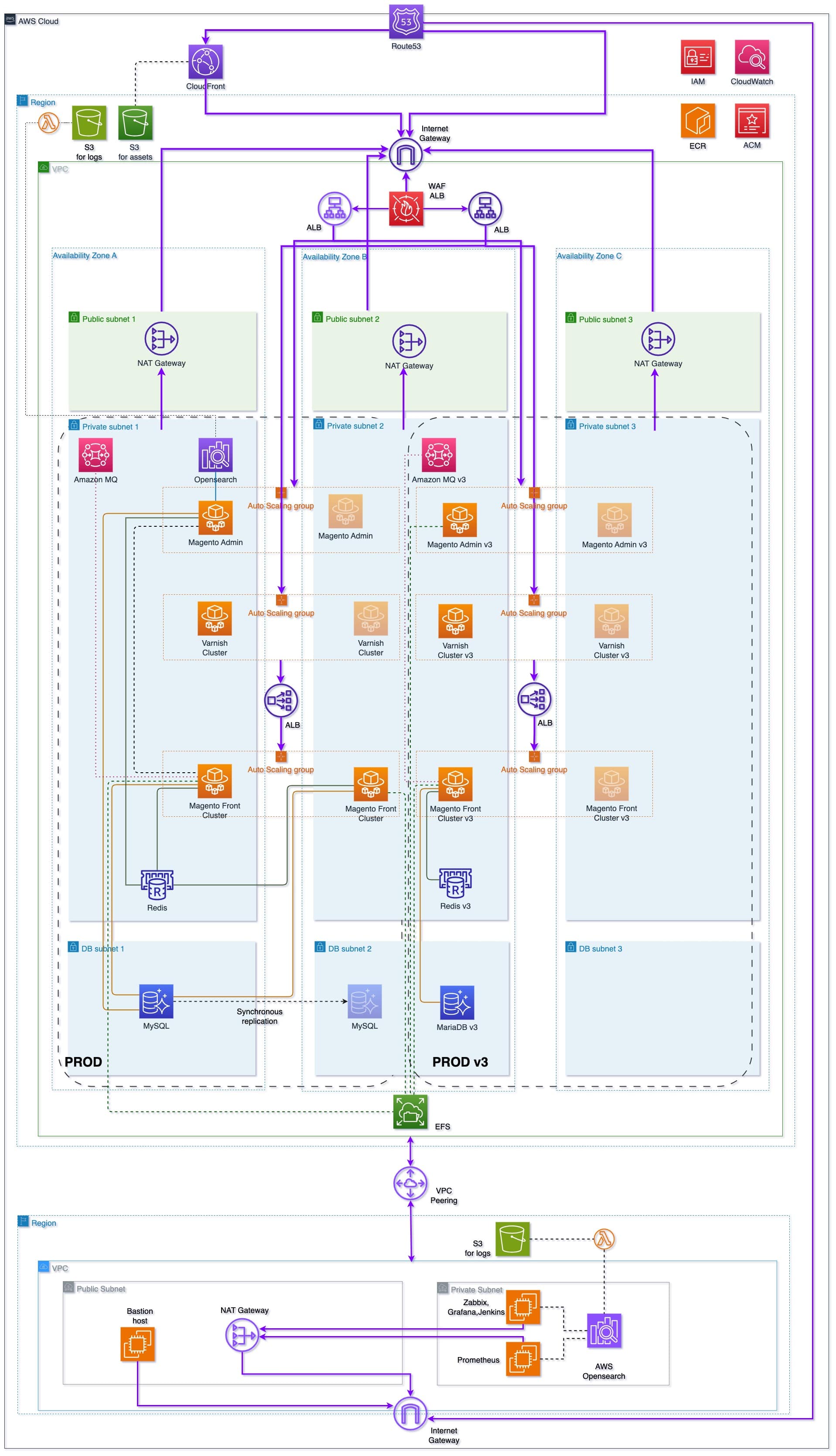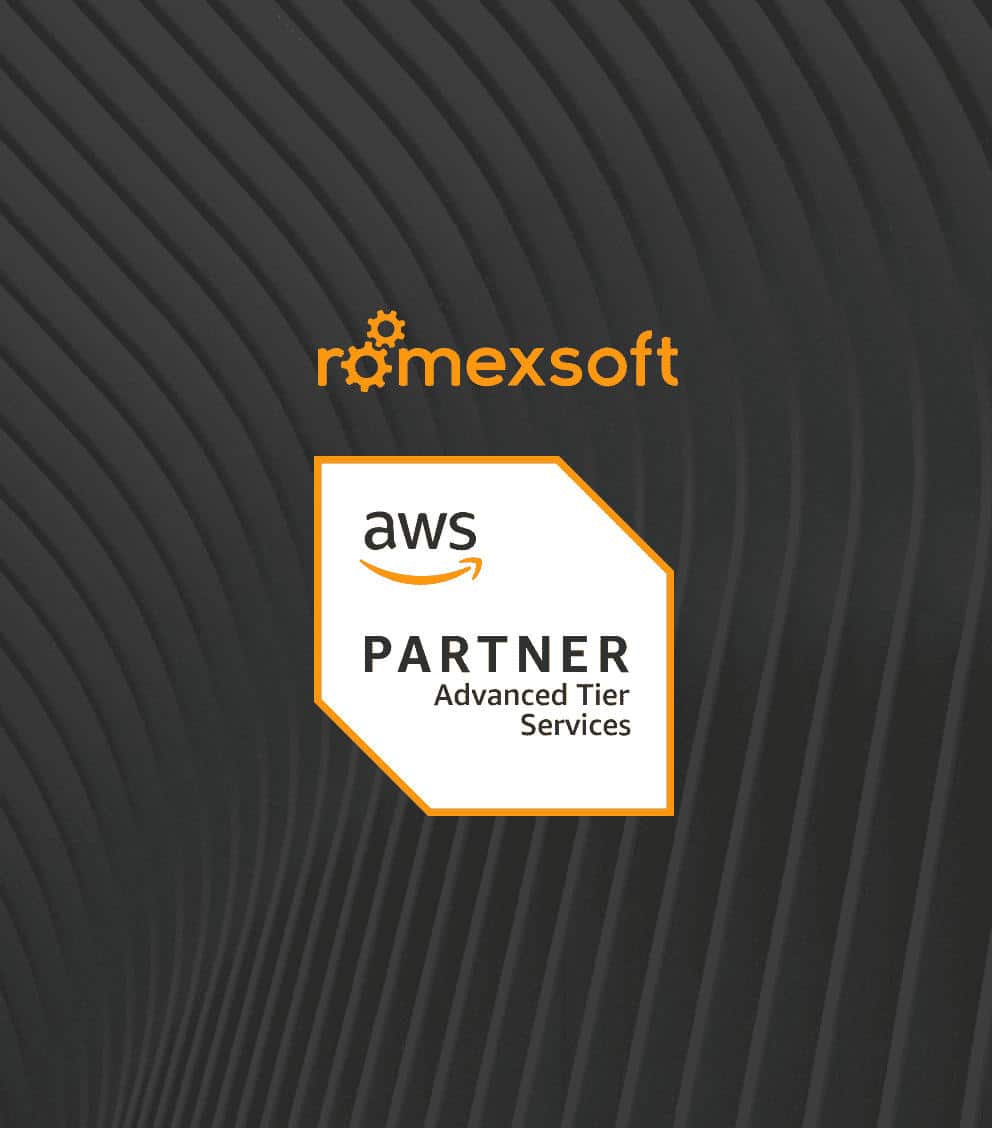Magento 2.3 to 2.4 Transition Supported by AWS Hosting Environment
The upgrade from Magento 2.3 to 2.4 was performed on AWS hosting with CI/CD automation, increased performance, and a zero-downtime deployment approach.

Our Customer
E-Commerce Platform
Gorgany is a huge retail, wholesale & distribution company of outdoor equipment in Ukraine. The company specializes in the wholesale trade of goods for tourism, mountaineering, skiing, and active recreation.
The Challenges
Security Exposure, Slower Performance, and Integration Conflicts
The client’s development team planned to upgrade from Magento 2.3 to Magento 2.4 to improve their solutions’ performance, scalability, and security, as well as to access new features. They needed DevOps professionals who understood the complexities and potential pitfalls of such an upgrade and could help prevent potential issues, thereby avoiding negative consequences and financial losses for the entire organization.
Extension Compatibility
The client relied heavily on numerous third-party extensions to support application functionalities. Validating and updating these extensions for compatibility with Magento 2.4 was critical to ensure they continued to work seamlessly post-upgrade.
Integrations Conflicts
The client’s platform was integrated with various custom solutions tailored to their specific commercial needs. Ensuring that these custom integrations were compatible with Magento 2.4 required thorough testing and potential redevelopment for maintaining business continuity.
Data Integrity Risks
Safeguarding the integrity of large volumes of transactional data during the upgrade was paramount. Any data loss or corruption could result in significant disruptions, affecting customer trust and operational efficiency.
Possible Downtime
There was a possibility that some critical issues could arise during an upgrade. Therefore, the client needed a reliable plan to revert to the previous version of Magento without causing disruptions to their business operations.
Scalability Challenges
The client needed to ensure that the upgraded platform could handle increased traffic, especially during peak seasons. The scalability of the system was vital to support entrepreneurial growth and maintain a high level of service during high demand periods.
User Experience Concerns
Enhancing the user experience was a top priority. The upgrade aimed to provide faster load times and smoother navigation, which are essential for retaining customers and driving sales. Any issues in these areas could negatively impact the client’s trade performance.
Performance Optimization
Implementing a comprehensive suite of automated tests to validate the upgrade was necessary to ensure that all aspects of the platform functioned correctly. Additionally, improving page load times and the checkout process was essential to reduce cart abandonment rates.
Security Vulnerabilities
The client needed to proactively address potential security vulnerabilities. Therefore, meeting the latest security standards was required for protecting sensitive customer information and maintaining compliance with industry regulations.
The Solution
Magento Upgrade to Version 2.4 Supported by AWS Hosting Infrastructure
Pre-Upgrade Preparation
IT Environment Setup
- Infrastructure as Code (IaC) Implementation
We utilized Terraform to provision and manage AWS resources such as ECS, RDS, CloudFront, Redis, MQ, and S3. This method maintained consistent and repeatable infrastructure deployment, enhancing reliability and scalability. - Staging Environment Establishment
To mirror the production environment, we created a staging environment using IaC scripts. This setup included configuring ECS, RDS, CloudFront, Redis, and MQ to replicate the production infrastructure, ensuring accurate testing and seamless transitions. - Configuration Management
Here we employed Docker to build images with the necessary dependencies, PHP versions, and configurations required for Magento 2.4. This streamlined the deployment process and maintained consistency across different environments.
Backup and Recovery
A robust fallback strategy was implemented to quickly revert to the previous version of Magento in case of critical issues. This included restoring from backups and redirecting traffic back to the old environment, preventing disruptions.
Compatibility Check
The thorough review of all third-party extensions and custom themes were made to establish compatibility with 2.4 version. Our team collaborated with vendors to obtain updates or patches for any incompatible extensions, testing these in the staging environment.
Testing and Validation
Continuous Integration/Continuous Deployment
- CI/CD Pipeline
We set up a CI/CD pipeline using Jenkins to automate the build, testing, and deployment processes. The pipeline included steps for code validation, automated testing, and deployment to the staging environment, resulting in a streamlined and efficient workflow. - Automated Testing
We integrated unit tests, integration tests, and end-to-end tests into the CI/CD pipeline. Tools such as PHPUnit for unit testing, JMeter for load testing, and Selenium for end-to-end testing were used to conduct comprehensive reliability testing.
Performance Testing
- Load Testing
We conducted load testing using Apache JMeter to simulate high traffic and identify performance bottlenecks. This allowed us to optimize the system for peak performance under various conditions. - Performance Monitoring
We utilized AWS CloudWatch and Prometheus to monitor application performance and metrics continuously. This proactive approach ensured that any performance issues could be quickly identified and addressed.
Upgrade Execution
Maintenance Window
- Scheduled Upgrade
We scheduled the upgrade during off-peak hours to minimize impact on users. The maintenance window was communicated to users in advance, which led to transparency and minimal disruption. - Blue-Green Deployment
To shorten downtime, we implemented a blue-green deployment strategy. This involved deploying the new version of Magento to a parallel environment and switching traffic to the new environment once testing was complete, ensuring a flawless transition.
Database Migration
We used scripts to migrate data from MySQL to MariaDB, ensuring data integrity and minimal technical outage. This meticulous process entailed a seamless transfer of all necessary data.
Code Deployment
- Deployment Automation
We automated the deployment process using Jenkins for consistent and repeatable deployments. This automation reduced the risk of human error and enhanced the efficiency of the upgrade process. - Cache Management
We utilized Redis for session and cache storage. With the optimal performance and a seamless user experience in mind, we implemented automated cache clearing and reindexing as part of the deployment process.
Post-Upgrade Validation
Functional Testing
Any issues identified during UAT (User Acceptance Testing) were promptly addressed and fixes were redeployed using the CI/CD pipeline. This step is responsible for all functionalities working seamlessly post-upgrade.
Performance Observability
- Real-Time Monitoring
AWS CloudWatch and Prometheus were utilized for real-time performance monitoring. Alerts were set up to detect any anomalies or performance degradation so as to immediately address potential issues. - Optimization
Based on real-time metrics and user feedback, continuous refinement was performed. This included tuning database queries and adjusting server configurations to enhance performance and user experience.
Go Live
DNS Update
The DNS was switched to point to the new Magento 2.4 environment using AWS Route 53, ensuring a seamless transition from the old to new environment with minimal disruption.
User Notifications
Users were informed about the upgrade, new features, and any expected downtime through email notifications and website banners. This proactive communication helped manage expectations and maintain user trust.
Continuous Monitoring
The environment continued to be monitored using AWS CloudWatch and AWS Trusted Advisor. This ongoing vigilance was necessary for sustained performance and security, more specifically, by promptly addressing any issues that arose.
Magento 2.4 Supported by AWS Hosting Environment

The Results
Sccessful Magento Upgrade to Version 2.4 on AWS
By leveraging AWS infrastructure and best DevOps practices, the upgrade of the clients’ platforms from Magento (Adobe Commerce) version 2.3 to 2.4 was successfully executed, resulting in enhanced performance, security, and scalability of the solutions while ensuring a seamless experience for its users.
- Business continuity
The project achieved a seamless upgrade with minimal downtime. This aguaranteed no data loss and provided an uninterrupted user experience during the transition, ultimately preventing any financial impact for the client. - Improved performance
Following the upgrade, a significant 25% faster page load time was observed. This enhancement contributed to a faster and more responsive platform, improving overall user satisfaction. - User satisfaction
Positive feedback from users highlighted their satisfaction with the seamless transition and improved performance. The smooth Magento upgrade process reinforced user trust and confidence in the platform. - Enhanced security
In the 2.4 version of the Magento, over 30 security issues were addressed to protect against remote code execution (RCE) and cross-site scripting (XSS). Therefore the upgrade fortified the client’s solutions against potential threats and ensured overall protection for user data. - Automated scalability
By leveraging AWS auto-scaling features, the platform can now efficiently handle increased traffic. This scalability ensures that the system can adapt to varying loads without compromising performance. - Operational efficiency
The use of CI/CD pipelines and configuration management tools has established a repeatable process for future upgrades. This ensures that subsequent updates can be performed efficiently and with minimal risk, maintaining the platform’s reliability.
Why Romexsoft
AWS eCommerce Development Vendor
Romexsoft is a custom eCommerce application development vendor with AWS Magento hosting experience. Our clients benefit from stable, scalable, and high-performance eCommerce infrastructures that support continuous uptime and expedite the delivery of online services.
Our customers trust us as we:
- Implement secure, PCI DSS–compliant architectures protecting sensitive customer and transaction data.
- Optimize Magento environments for faster page load times and improved Core Web Vitals performance.
- Integrated CI/CD automation ensuring reliable, zero-downtime deployments.
- Designed multi-store and multilingual setups supporting global retail operations.
AWS Magento Hosting FAQ
1. Audit all extensions and confirm Magento 2.4 support in vendor docs/release notes.
2. Update to compatible versions and pin in composer.json.
3. Mirror production in staging (same PHP/DB/search stack).
4. Run the upgrade in staging with automated tests (unit/integration/MFTF) and checkout/payment smoke tests.
5. Resolve conflicts, retest, and validate performance/security.
6. Deploy via blue-green (or canary) with a tested rollback plan.
If you hit issues at any step, contact an experienced vendor to diagnose and fix quickly.
CI/CD improves Magento deployments by automating code integration, testing, and delivery. It helps teams release updates faster, reduce manual errors, maintain consistent environments, and achieve zero-downtime deployments across staging and production.
Running Magento on AWS ECS is best for scalable, containerized environments that require automation, cost efficiency, and simplified management through AWS-native orchestration.
In contrast, AWS EC2 is more suitable for legacy Magento setups that need full operating system control, custom configurations, or are not yet containerized.
Key metrics for evaluating Magento performance on AWS include CPU utilization, memory usage, disk I/O, network latency, and database query time. Application-level indicators such as page load time, server response time, cache hit ratio, and error rate reveal how well the platform performs for users. Monitoring these metrics with Amazon CloudWatch and AWS X-Ray helps identify bottlenecks early, optimize resource usage, and maintain a fast, reliable eCommerce experience.


